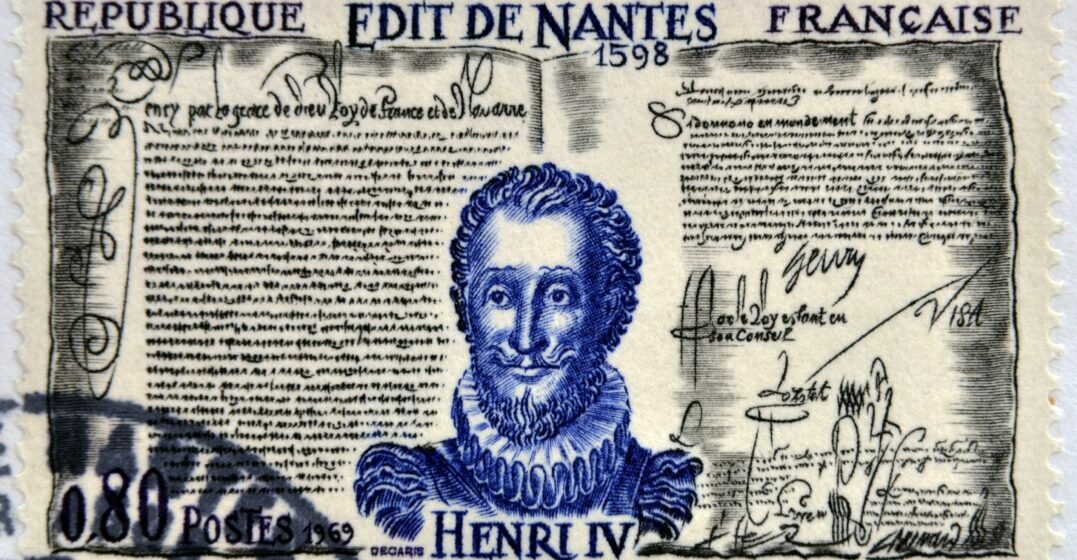What was the Edict of Nantes?
Published on March 25, 2022 / Updated on January 8, 2024
The Edict of Nantes was a decree providing civil rights and liberties to Protestants in France, thereby putting an end to the French War of Religions. It was signed by King Henry IV in April 1598.
As a country, France has a rich and extensive history which many foreigners know all about. For example, you may be familiar with Napoleon and the French Revolution. One event which may be less well known surrounds the édit of Nantes, or Edict of Nantes in English. This decree temporarily ended the French Wars of Religion during the 16th century. While lesser known, this important part of history may help you to understand the background of religion in France, which is now considered a secular country. We’ll provide some of the events leading up to the edict, what the edict actually was and why it was eventually revoked by another edict called the Edict of Fontainebleau.
During the 16th, 17th and 18th centuries, there were many wars of religion in Europe. The French Wars of Religion were some of the worst, involving Catholics and Calvinist Protestants known as Huguenots. It began in 1562 in Vassy, a time in which France was essentially a Catholic country. The war dragged on for a dire 36 years. Both sides committed awful acts, the deadliest of which was in 1572: the St. Bartholomew’s Day massacre. It lasted several weeks and involved targeted attacks and violence towards the Huguenots. Thousands were killed.
In 1589, Henry of Navarre nominally became King of France following the death of his distant relative. He became King Henry IV. Prior to this, he was Protestant but he converted to Catholicism before his official coronation in 1594. This is perhaps why he was keen on reaching a peaceful agreement between the two religions. The agreement came in the form of a decree providing religious tolerance for the Huguenots in France. It was named the édit de Nantes 1598 (Edict of Nantes), as it was signed by the King in April 1598 in Nantes.
This decree was significant for many reasons. First, it gave Protestants civil rights such as access to education and the right to work in any field, thereby creating more religious tolerance and unity in the country. Second, these rights were previously unheard of in France. No prior monarch had tolerated both religions, nor had they allowed them to co-exist peacefully. And third, the Edict was one of the first legal decrees of religious tolerance in Europe. It also essentially put an end to the French Wars of Religion.
While neither side was particularly happy with the agreement, the fighting never reached the level of the violence from before the edict was issued.
Given that so many people were unhappy with the original édit de Nantes, there were many attempts on King Henry IV’s life. In 1610, a Catholic zealot succeeded in killing him. In effect, the Edict of Nantes was more of a royal decision to implement religious tolerance rather than a popular one.
Almost a century later in 1685, King Louis XIV decided to revoke the original edict with a new one – known as the édit de fontainebleau (Edict of Fontainebleau). As a King, Louis XIV was firm in his belief of an absolute monarchy and the divine rights of kings. As a Catholic himself, he wanted to re-establish France as a Catholic country.
The révocation de l’édit de Nantes (revocation of the Edict of Nantes) was his way of doing this. Many historians agree this was a terrible decision, as it led to a mass emigration of Huguenots: more than 400,000 left the country. It took yet another century before this Edict was abolished in France and Protestants could live freely. The French Revolution brought a more permanent end to tension between both groups, by abolishing the monarchy and introducing the First Republic.
Despite the complicated background of this historic event, the Edict of Nantes was considered a victory and credited with ending the French Wars of Religion. It was also seen as one of King Henry IV’s greatest achievements and is an important part of religious history in France. If you’d like to learn more about French history, why not start learning the language – it’s an excellent way to give you access to more information about this amazing country!
